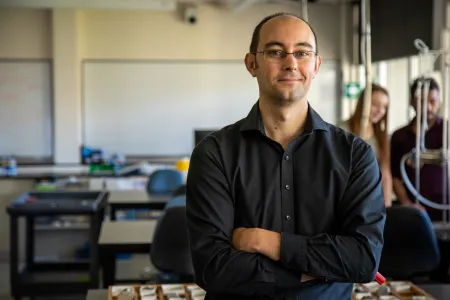News
Global research warns climate change is increasing groundwater temperatures
A world first global groundwater temperature model projects that shallow groundwater will warm on average by between 2.1 and 3.5 degrees Celsius by the end of the century.
Charles Darwin University (CDU) Outstanding Future Researcher Dr Dylan Irvine and University of Newcastle’s Dr Gabriel Rau collaborated with colleagues from Canada, Germany, and Austria to develop the model, which aims to reveal the long-term implications of on-going shallow water groundwater warming caused by climate change.
The model projects the highest warming rates will be in Central Russia, Northern China and parts of North America and the Amazon rainforest, with Australian groundwater temperatures also expected to rise.
Dr Irvine from CDU’s Research Institute for the Environment and Livelihoods said an increase in groundwater temperature can be a cause for concern.
“Groundwater is the water that is present beneath the Earth’s surface in pore spaces in rocks and soils. It is critical for life on earth,” Dr Irvine said.
“Groundwater temperature can influence a ecosystems, aquatic processes and water quality. If groundwater temperatures increase, then unfortunately many temperature sensitive groundwater dependent ecosystems may be threatened.
“A lot of focus on climate change has rightfully been to do with weather events and the availability of water, but we do need to think more broadly about the impact that climate change will have on groundwater.”
Unfortunately, for Australia the model projects that like other countries our groundwater temperatures are expected rise.
“Our groundwater here will warm but how much depends on whether or not humans can reduce greenhouse gas emissions to help mitigate climate change,” Dr Irvine said.
“These temperature increases can impact vital processes such as groundwater chemistry and metal leaching and microbiology which affects water quality.”
“If temperatures increase then we may see significant impacts to our local aquatic animals including their spawning processes which will impact industries and communities that are reliant on these ecosystems.”
Co-author and hydrogeology Lecturer from the University of Newcastle, Dr Gabriel Rau, warned that warming groundwater temperatures could adversely impact many ecosystems that rely on groundwater.
“Rivers rely on groundwater to keep flowing during dry times. Warm waters hold less dissolved oxygen. We’ve seen in the Murray Darling how low oxygen in water can contribute to fish deaths,” Dr Rau said.
According to the World Health Organisation, currently only 18 out of 125 countries have temperature guidelines for drinking water.
If groundwater continues to warm, it could also compromise the safety of drinking water.
“Our model estimates that by 2099, 59 to 588 million people worldwide will live in areas where groundwater exceeds the highest threshold for drinking water temperature guidelines set by any country,” Dr Rau said.
“As groundwater warms, there is increased risk of pathogen growth which impacts drinking water quality - potentially affecting the lives of many people.”
“This is especially concerning in areas where access to clean drinking water is already limited, and in areas where groundwater is consumed without treatment.”
Dr Rau also explained that rising groundwater temperatures also pose an economic risk.
“Many vital industries like agriculture, manufacturing, and energy production rely on groundwater for their operations. If the groundwater they depend on becomes too warm or more contaminated, it can disrupt their activities and potentially lead to economic losses,” Dr Rau said.
To illustrate the potential change in groundwater temperatures due to climate change, the research team, led by Dr Susanne Benz from the Karlsruhe Institute of Technology, has developed an interactive online application to show the projected temperature changes.
This Google Earth Engine app provides zoomable maps of annual mean, maximum and minimum groundwater temperatures at different depths and seasonal variability for selected years and climate scenarios, that the team hopes will facilitate further research.
The research paper titled ‘Global groundwater warming due to climate change’ can be found in the journal Nature Geoscience.
Related Articles

First “hype cycle” of AI development put tech above humans
Users around the world have rushed to adopt artificial intelligence - especially in safety-critical fields - but a new study has revealed the hype has prioritised technology for technology’s sake instead of human-centred development.
Read more about First “hype cycle” of AI development put tech above humans
Nanoplastics hindering cognitive abilities of fish, international research shows
Nanoplastic exposure can impair the cognitive abilities of fish and could lead to significant impacts on marine species’ ability to survive, according to a new international study.
Read more about Nanoplastics hindering cognitive abilities of fish, international research shows
Eradication would cost billions: NT’s lessons for Pilbara’s cane toad management
Cane toads are predicted to invade Western Australia’s Pilbara region by 2041 if left unchecked, but the Northern Territory’s population of the pests hold key lessons that could save billions in eradication costs.
Read more about Eradication would cost billions: NT’s lessons for Pilbara’s cane toad management
